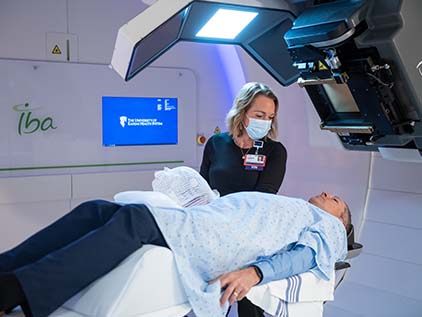Prostate Cancer

Prostate cancer is the second leading cause of cancer death in US men, with about 1 in 8 men being diagnosed with prostate cancer in their lifetime. But when caught early and treated by prostate cancer specialists, most men have a successful outcome.
The National Cancer Institute estimates that in 2024, there will be nearly 300,000 new prostate cancer diagnoses across the country ̶ including 2,820 in Kansas and 5,510 in Missouri. Prostate cancer often has no symptoms until it has advanced or spread to other areas of the body, at stage III or IV. Yet when found early, at stage I or II, prostate cancer is one of the most treatable cancers, with a 10-year survival rate of nearly 98%.
At The University of Kansas Cancer Center, the region’s only National Cancer Institute-designated comprehensive cancer center, our nationally recognized multidisciplinary team of prostate cancer subspecialists focuses only on prostate cancer. We tailor prostate cancer treatment to the individual as part of our comprehensive approach to care.
Patients receive care from a team of nationally recognized prostate cancer experts in urologic oncology, radiation oncology, medical oncology and supporting specialties. Together, these experts design effective personalized treatment for each patient based on their specific cancer features, overall lifestyle and other critical influences.
Our precision cancer therapies integrate a patient’s tumor data into all treatment decisions. We do not take a one-size-fits-all approach to treatment because not all prostate cancer is the same. Ensuring you receive personalized treatment means better treatment, better outcomes, a better experience and better survivorship.
Whether you are concerned about your risk of prostate cancer or have been diagnosed and need answers or a second opinion, we are here and ready to support you and your loved ones in this process.


Prostate cancer care overview
The prostate is a gland that sits just below the bladder. Responsible for making part of the fluid for semen, the prostate is about the size of a walnut in young men and usually grows larger as you age. Prostate cancer occurs when cells in the prostate become abnormal. Over time, these cells can form a tumor.
Most prostate cancers grow slowly and don’t spread past the prostate gland. This type of prostate cancer may require only minimal treatment, or even no treatment at all. However, other types of prostate cancer can be more aggressive and grow very quickly. Like other kinds of cancer, prostate cancer can spread beyond the prostate to other organs of the body (metastasize).
As with many cancers, doctors have a better chance of successfully treating prostate cancer when we can diagnose it early. This can be a challenge, as early-stage prostate cancer often has few symptoms. To diagnose prostate cancer, doctors recommend regular screening.
Screening for prostate cancer is the cornerstone of early detection. We recommend annual screening for:
- African American men over 40
- All men beginning at age 45
- Men over 40 with a family history of prostate cancer
The University of Kansas Cancer Center’s prostate cancer program focuses on giving you the latest and most advanced prostate cancer care, including:
Prostate cancer screening
High-risk screening
We offer the Burns & McDonnell High-Risk Prostate Cancer Screening Program, the first of its kind in the Kansas City region. The program is available to men from across the Kansas City area and beyond who are at high risk of developing prostate cancer. Patients receive comprehensive services delivered by urologic oncologists (urology cancer doctors) and advanced practice providers from numerous specialties, at multiple convenient locations 5 days a week. The program is part of The University of Kansas Cancer Center’s effort to provide the region with the most advanced cancer prevention and care available anywhere.
Advanced screening methods
Prostate cancer screening can include more than a prostate‑specific antigen (PSA) blood test. Our team of experts uses the most innovative screening strategies to enhance cancer detection, including:
- Multiparametric MRI
- Micro-ultrasound
- Fusion biopsies
Multidisciplinary care and treatment
Why choose The University of Kansas Cancer Center?
The University of Kansas Cancer Center is part of a nationwide network of select cancer research centers established by the National Cancer Institute, part of the National Institutes of Health. NCI-designated cancer centers achieve patient outcomes that are 25% better than those of other centers.
Our dedicated team of prostate cancer doctors comprises fellowship-trained urologic surgical oncologists, urologic medical oncologists, urologic radiation oncologists and urologic pathologists. We provide the most advanced medical and surgical care for prostate cancer patients, including screening and prevention, active surveillance and survivorship. As the region’s largest cancer center, we have 14 locations throughout Kansas City. Our prostate cancer program has been recognized as 1 of 13 Clinical Centers of Excellence in the nation by Urology Times. Additionally, U.S. News & World Report ranks our urology program among the nation’s top in cancer care. The urologic oncologists at The University of Kansas Cancer Center set the standard for care and treatment in prostate cancer and other urologic specialty areas.
Ours is the only team in the region offering Retzius-sparing radical prostatectomy, a minimally invasive robotic surgery that allows us to remove the prostate in a less invasive way ̶ dramatically reducing recovery time and unwanted side effects. We offer the most advanced treatments in radiation oncology, including brachytherapy, stereotactic body radiation therapy (SBRT) and SpaceOAR™ and opened the first Proton Therapy Center in Kansas City. We also offer many clinical trials for early-stage (I and II), advanced and metastatic (stage III and IV) prostate cancer and are at the forefront of clinical studies with immunotherapy and targeted therapy used to treat prostate cancer.
We are 1 of fewer than 60 NCI-designated comprehensive cancer centers nationwide. NCI-designated cancer centers are the backbone of innovative research and patient care across the country. We treat patients from across the US and around the globe at our multiple locations. Since 2012, we have diagnosed and treated patients from 50 states and 26 countries.



Learn more about prostate cancer

Timing is everything
Start your path today.
Your journey to health starts here. Call 913-588-1227 or request an appointment at The University of Kansas Cancer Center.